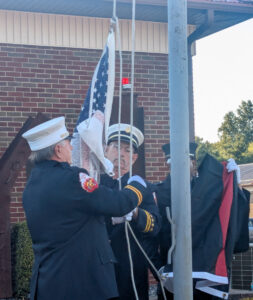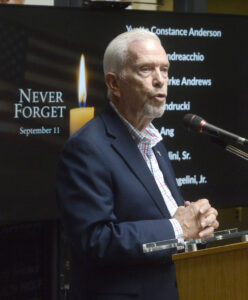Howland sets special meeting for property taxes
HOWLAND — With a proposal by a group of citizens pushing for a statewide amendment to repeal Ohio’s property tax, township officials hope to take the initiative on the matter by holding a public meeting.
Trustees at Wednesday’s regular meeting approved a special meeting for 6 p.m. Sept. 22 at the township’s administration building to discuss the real property tax system, the impact of bills pending in the general assembly and for constitutional amendment on the local governments and entities in Trumbull County. Officials also hope to discuss the limitations existing on entities and local governments to adopt a new real property taxation system.
Trustee Matthew Vansuch, who wrote the notice’s language, said that trustees understood the impact and shock property valuations have had on property taxes — as well as the interest in providing relief to people living in the state.
“Any changes to the system need to be well thought out and thoroughly reviewed for both the short- and long-term impact that they may have on local governments,” Vansuch said. “And the residents and businesses who have invested in their futures based on that system.”
Vansuch said officials support having discussions about them, adding that they wanted residents to be in a better position after any changes are made — expressing his belief that it requires the township to be in a similar position.
“We also make sure that policymakers appreciate how potential changes will impact the provision of fundamental services to our residents, like police, fire and EMS, and roads that make our community what it is,” Vansuch said.
Fiscal Officer Thomas Krispinsky said in terms of how much of the township’s operating budget comes from property tax, the police, fire and roads departments are all “more or less” on levies — meaning it was 100% for them.
“Operation for the general fund, I would probably say 60% of that (is property tax),” Krispinsky said.
Trustee James LaPolla said that for the property tax to go away altogether, it could be “potentially devastating” without considering alternative functions.
Vansuch said he learned from his predecessors that it’s good to plan ahead — having a plan B, C and D.
“What we are seeing in Columbus right now is, we just don’t know what’s going to happen. We don’t know if the constitutional amendment’s going to pass,” Vansuch said. “We don’t know what bills, if any, are going to pass in combination thereof, and there’s a working group to discuss wholesale changes to the system.”
Vansuch said there were things they could not do as a township — even with 18,500 people — that small villages could do.
“We are constrained by the same rules that govern Johnston Township, Greenville Township,” Vansuch said. “We have a little bit of home rule power, but it doesn’t allow us to solve a lot of these problems.”
Vansuch said it was important to the township that they made sure the county’s commissioners — who regularly have conversations with state officials — regularly understand and hear the impact and what tools they could give them to put them in a better position.
LaPolla said he agreed with Vansuch, pointing out that state representatives who represent rural farmers, have “much different” needs than the townships.
“I know we can be a village or a city — not that we want to be a village or a city, but it’s not that guaranteed option, nor is it the best option possible,” LaPolla said.
Trustee Frank Dillon said he was concerned about how residents would react if they had the option to eliminate property tax.
“I don’t think there’s a person in this room, that, if when asked if you could eliminate your property taxes would say, ‘No, I want to keep paying them,'” Dillon said. “But then the problem is, they don’t understand the ramifications of that and how it affects small government — especially township government.”
Dillon questioned how the township could make up the loss of income, because they can’t impose a sales or income tax.
“We’re going to hope the county is going to double the sales tax — if not more — to meet their needs,” Dillon said. “But where does that leave us when it comes time to share money or having money to operate the government in general — police, fire, road, everything?”
LaPolla said he hopes elected officials at the state and county level can make it to the meeting, so they can see the impact of their decisions on the township and constituents’ hearts.


